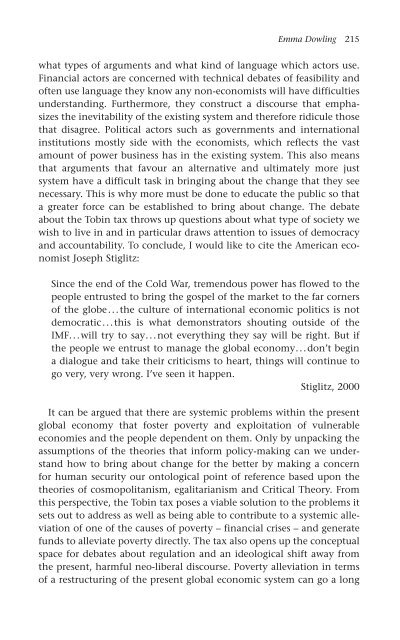3071-The political economy of new slavery
3071-The political economy of new slavery
3071-The political economy of new slavery
You also want an ePaper? Increase the reach of your titles
YUMPU automatically turns print PDFs into web optimized ePapers that Google loves.
Emma Dowling 215<br />
what types <strong>of</strong> arguments and what kind <strong>of</strong> language which actors use.<br />
Financial actors are concerned with technical debates <strong>of</strong> feasibility and<br />
<strong>of</strong>ten use language they know any non-economists will have difficulties<br />
understanding. Furthermore, they construct a discourse that emphasizes<br />
the inevitability <strong>of</strong> the existing system and therefore ridicule those<br />
that disagree. Political actors such as governments and international<br />
institutions mostly side with the economists, which reflects the vast<br />
amount <strong>of</strong> power business has in the existing system. This also means<br />
that arguments that favour an alternative and ultimately more just<br />
system have a difficult task in bringing about the change that they see<br />
necessary. This is why more must be done to educate the public so that<br />
a greater force can be established to bring about change. <strong>The</strong> debate<br />
about the Tobin tax throws up questions about what type <strong>of</strong> society we<br />
wish to live in and in particular draws attention to issues <strong>of</strong> democracy<br />
and accountability. To conclude, I would like to cite the American economist<br />
Joseph Stiglitz:<br />
Since the end <strong>of</strong> the Cold War, tremendous power has flowed to the<br />
people entrusted to bring the gospel <strong>of</strong> the market to the far corners<br />
<strong>of</strong> the globe...the culture <strong>of</strong> international economic politics is not<br />
democratic...this is what demonstrators shouting outside <strong>of</strong> the<br />
IMF...will try to say...not everything they say will be right. But if<br />
the people we entrust to manage the global <strong>economy</strong>...don’t begin<br />
a dialogue and take their criticisms to heart, things will continue to<br />
go very, very wrong. I’ve seen it happen.<br />
Stiglitz, 2000<br />
It can be argued that there are systemic problems within the present<br />
global <strong>economy</strong> that foster poverty and exploitation <strong>of</strong> vulnerable<br />
economies and the people dependent on them. Only by unpacking the<br />
assumptions <strong>of</strong> the theories that inform policy-making can we understand<br />
how to bring about change for the better by making a concern<br />
for human security our ontological point <strong>of</strong> reference based upon the<br />
theories <strong>of</strong> cosmopolitanism, egalitarianism and Critical <strong>The</strong>ory. From<br />
this perspective, the Tobin tax poses a viable solution to the problems it<br />
sets out to address as well as being able to contribute to a systemic alleviation<br />
<strong>of</strong> one <strong>of</strong> the causes <strong>of</strong> poverty – financial crises – and generate<br />
funds to alleviate poverty directly. <strong>The</strong> tax also opens up the conceptual<br />
space for debates about regulation and an ideological shift away from<br />
the present, harmful neo-liberal discourse. Poverty alleviation in terms<br />
<strong>of</strong> a restructuring <strong>of</strong> the present global economic system can go a long


